Baby Boomers' Opportunity to Reinvent Things
About half of baby boomers told us in our Age Wave Study that their retirement isn’t going to mean that they stop working. Many plan to do work that they enjoy in retirement. As baby boomers have more time, America will have a wealth of experience and expertise that should shape some pretty valuable innovations and change in this country. It’s baby boomers who will transform senior housing and aging services, and a number of other professions, too, perhaps even newspapers.In Minnesota, a group of baby boomers see that traditional print newspapers haven’t figured this internet thing out yet, and they see huge opportunity. Yesterday former Minneapolis Star Tribune publisher and editor Joel Kramer announced that he and a bunch of other boomers are starting an online newspaper called MinnPost. It looks to go beyond simple, quick hit, slash and burn journalism and provide much deeper insight and analysis. You can read the full MinnPost reporter roster to date here. It’s an impressive list. And MinnPost will be a welcome addition and, hopefully, a model for other communities.While other papers are dropping their aging beats, MinnPost has snagged Kay Harvey, formerly of the St. Paul Pioneer Press, who will cover aging, demographics, gender and psychology. A lot of interesting fodder out there when it comes to the age wave and future of Minnesota and the country.Here’s an interview that Joel Kramer did with Leonard Witt, former Minnesota journalist and now professor at Kennesaw State University in Georgia. (Leonard, love your blog, but please, please drop the word 'geezers' out of your vocabulary … thank you.)
Michael Graves' New Vision and Legacy
Michael Graves, the renowned designer who has created many cool wares for Target, was in Minneapolis this weekend to receive the National Courage Award from the amazing Courage Center, which empowers people with disabilities. When he received his award, he commented on the people in the audience with wheelchairs and walkers, saying 'I love it, welcome to what will soon be the new normal.' He, of course, is talking about the age wave. Michael Graves became paralyzed three years ago when he contracted a viral infection. It changed his life and, undoubtedly, because of that, he’s going to change the lives of many others.In a great article in Metropolis Mag, journalist John Hockenberry describes Michael Graves' personal transformation … .After a lifetime of seeking beauty in everything he designed and obsessively making sure every detail in his physical space was selected to be purposeful and beautiful, he was suddenly trapped in a world of mundane medical objects. “Everything was ugly,” he says. “Nothing was designed. It seemed as though the makers of these objects never had to use them. There was no color, no style; nothing about any of the objects said that a human had made them. It was outrageous.” Graves said he once had his doctor come into his hospital bathroom, where he was trying to shave from his wheelchair: “€‰€˜Who designed these bathrooms?’ I asked him. He said, €˜Experts.’ I said, €˜Oh, really,’ and I had him sit down and look at himself in the mirror, which was too high, and then turn on the water, which was out of reach. It took him two seconds to get it.”“People who become disabled have to radically redesign their outlook about the physical world,” Graves says, remembering the first days after he was out of danger and learning to live with paralysis. “They redesign their sense of privacy and their sense of independence. Yet in the products they have to use, design has abandoned them.”Out of personal experience and vision, Graves has founded a new venture called Michael Graves Solutions, which brings smart design, style and elegance to products that help people live fully. Here’s a sampling of what is coming out of Michael Graves Solutions: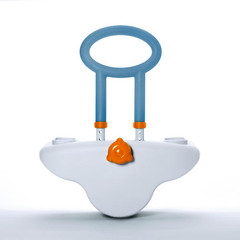 Tub RailThis height-adjustable tub rail is part of the first batch of medical devices by Michael Graves Design Group that debuted last year. The rail clamps onto the tub with a metal bracket, which the orange knob adjusts. “When-ever we can in the products we try to use the orange color to signify ad-justment,” director of design David Peschel told Metropolitan Mag. The orange rings on the handle pop off to allow it to be raised or lowered (there are four height settings). A soft rubber grip is overmolded onto the blue plastic, and a flexible white TPE rubber cover is available€”it conceals the metal base and has two recessed surfaces for soap or other items.
Tub RailThis height-adjustable tub rail is part of the first batch of medical devices by Michael Graves Design Group that debuted last year. The rail clamps onto the tub with a metal bracket, which the orange knob adjusts. “When-ever we can in the products we try to use the orange color to signify ad-justment,” director of design David Peschel told Metropolitan Mag. The orange rings on the handle pop off to allow it to be raised or lowered (there are four height settings). A soft rubber grip is overmolded onto the blue plastic, and a flexible white TPE rubber cover is available€”it conceals the metal base and has two recessed surfaces for soap or other items. 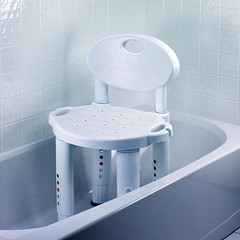 Bath Seat“The bathtub is a pretty scary environment for a lot of people,” Peschel says. This white plastic bath chair is designed to have a soft rounded look€”harmonious with common bathroom elements€”but also be extremely sturdy. “We wanted it to give off a character that it’s very strong and can support a lot of weight,” Peschel says. The design team achieved this by making the chair wider across the seat and back, and by attaching nonslip rubber end cups to the feet that have a patterned bottom surface to allow water to flow underneath, preventing suction to the tub surface. The seat also has a molded nonslip wave pattern (Graves’s sketch, above right) and built-in handles on the sides. Shower Heads
Bath Seat“The bathtub is a pretty scary environment for a lot of people,” Peschel says. This white plastic bath chair is designed to have a soft rounded look€”harmonious with common bathroom elements€”but also be extremely sturdy. “We wanted it to give off a character that it’s very strong and can support a lot of weight,” Peschel says. The design team achieved this by making the chair wider across the seat and back, and by attaching nonslip rubber end cups to the feet that have a patterned bottom surface to allow water to flow underneath, preventing suction to the tub surface. The seat also has a molded nonslip wave pattern (Graves’s sketch, above right) and built-in handles on the sides. Shower Heads Graves Design developed two handheld shower-spray products, both in white injection-molded plastic with blue overmolded rubber grips. The smaller one was designed to fit in the palm of the hand; people with arthritis or dexterity problems can comfortably use it without a tight grip. A swivel connector at the base allows the unit to spin without twisting the attached hose (it also fits into standard shower holders). €”
Graves Design developed two handheld shower-spray products, both in white injection-molded plastic with blue overmolded rubber grips. The smaller one was designed to fit in the palm of the hand; people with arthritis or dexterity problems can comfortably use it without a tight grip. A swivel connector at the base allows the unit to spin without twisting the attached hose (it also fits into standard shower holders). €”
Director of Aging Transformation, What a Great Title
It’s LaRhae Knatterud’s title at the Minnesota’s Department of Human Services. She was a driving force behind the fabulous Project 2030 research done between 1997 and 2002, looking ahead at the Age Wave that is moving ever closer.She and others from the Minnesota Department of Human Services have begun an extensive Minnesota 2010 road trip talking about the 'age wave' and opportunities for transformation. Go here for more information and to find an upcoming 2010 Summit near your community.
Yes, Seniors Have Sex, Too
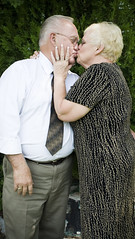 Why wouldn’t they? They’re people. But society’s stereotypes for older people don’t connect sex and seniors.
Why wouldn’t they? They’re people. But society’s stereotypes for older people don’t connect sex and seniors.
That’s why one of the most emailed stories in the country this morning was about the first comprehensive national survey of seniors’ sexual attitudes and activity. Conducted by the University of
According to the study, frequency of sexual activity dropped only slightly between the late 50s up to the early 70s. And more than half of those in the oldest age group €“ 75 to 85 €“ who were sexually active reported having sex at least two to three times per month, and 23 percent reported having sex at least once a week. There’s a lot of beneficial information in this survey that will be helpful in improving people’s lives, opening communications lines between people and their medical provider, and breaking down ageism Study co-author Edward Laumann, coauthor of the study and the George Herbert Mead Distinguished Service Professor in Sociology at the University of Chicago, said in HealthDay that “The linkage with sexual health is closer to other health issues and is not tied directly to aging per se. Sexual health, when it begins to deteriorate, may be an important warning sign, because it may be an early warning sign of more profound health problems.”
America’s Most Livable Communities for Seniors
AARP Magazine recently announced it’s top cities for successful aging in the United States. Minneapolis and Saint Paul didn’t make it. Ecumen CEO Kathryn Roberts' recent editorial in the Minneapolis Star Tribune sheds light on why.AARP’s top 5 livable communities for seniors are Atlanta, Milwaukee, Portland, Boston and Chandler, Arizona. Atlanta’s regional commission is all over successful aging. In Milwaukee, they hosted a very cool senior housing design competition at the University of Wisconsin-Milwaukee. The Milwaukee Aging Consortium and Aging Maven also highlights what’s occurring in Milwaukee in creating a livable community for all ages. Great stuff here for the Twin Cities and other communities.An idea: Minnesota and other states could start developing criteria that make a community a good one for successful aging. Once you get/earn the designation you could put it on your population sign, e.g., Rochester, A Great Age Community. Would show that the community is a livable community for all. For our Wisconsin readers: Ecumen CEO Kathryn Roberts will be giving the keynote address at HospiceCare Inc.'s annual conference in Madison at American Family Insurance’s headquarters on September 27th. The conference is entitled 'The Boomers are Here: Are We Ready?' Kathryn’s presentation is entitled: 'The Age Wave: America’s Opportunity for Transformation.' For more information on the conference, go here.
Minnesota Policymakers Starting to Feel Age Wave
Some policymakers are starting to feel the ripples of the age wave and how it will impact America. Whether that impact is good or bad, will depend on the actions we take today.When you look at the Ecumen Age Wave Study, you can see how aging is a great opportunity for policymakers to have a hugely positive impact. Successful aging is an American issue, not a Republican or Democrat issue.According to Kristine Gerencher at cbsmarketwatch.com between January and June Congress introduced 14 bills that would positively impact family caregivers or those they care for.Last week we talked about legislation introduced by Minnesota Sen. Amy Klobuchar. Today she had an op-ed appear in the St. Cloud Times addressing senior care. The text of which is below. Minnesota Senator Norm Coleman also is taking a look ahead, seeing the substantial role that technology can play in successful aging and senior care, he introduced in February legislation that would create a consortium to foster development of technologies that would enhance independence, health and lower costs. The age wave is coming …Minnesota and the nation will soon experience major changes as the baby boomer generation reaches retirement age and as more Americans live into their 80s and beyond.We know seniors want to be able to live independently and stay in their own homes as long as possible. Families, especially adult children, are essential in helping to make this happen.It is already a big issue for many families, and it will only get bigger.The number of Minnesotans older than age 65 is expected to double from 2000-30, approaching a quarter of the state’s total population.At the same time, the number of Minnesotans available to care for them will shrink. Although suburban communities will experience the most dramatic changes in the future, the impact is currently most serious in rural Minnesota.Most senior care comes from informal caregivers. Adult daughters and sons are increasingly responsible for helping their parents with tasks ranging from the mundane (like shopping for groceries and helping with chores around the house) to the more intensive (like managing personal finances and helping to make major health care decisions).Many caregivers belong to the 'sandwich generation.' They support their aging parents while also struggling to raise their own children, sandwiched by competing demands for caregiving.Caregiving can be an overwhelming responsibility for many families. It can be an exhausting and endless job. It does not get easier over time. As a result, many caregivers develop physical and mental health problems.Caregiving also comes with serious financial costs.Most caregivers report taking time out of the work force, cutting back on hours and turning down promotion opportunities.One recent study found women who provide care to an aging parent suffer about $8,600 per year in lost wages and benefits.Family caregiving also has a significant impact on our economy, costing businesses an estimated $33 billion annually in lost productivity.For all of these reasons, I am introducing federal legislation to assist our family caregivers.First, I want to provide financial relief by expanding the existing federal Dependent Care Tax Credit so families can claim tax credits for expenses incurred caring for their aging relatives who do not live with them.Families will be eligible for up to $1,200 in tax relief per year. While this will by no means cover all elder care expenses, it is a start.Second, I want to enhance support for family caregivers by promoting best practices in quality, coordinated care and by providing more direct support for family caregivers.The legislation will establish a National Caregiving Resource Center where families, public agencies and private organizations can learn about best practices and promising innovations.This legislation will also bolster support for the National Family Caregiver Support Program, which helps fund direct services to family caregivers.Third, I want to protect consumers and make it easier for families to prepare for their needs by requiring more accountability from the long-term care insurance industry.About 8 million Americans have bought long-term care insurance to protect themselves and their families.But one of the biggest complaints is the denial of benefits.The only recourse for consumers right now is to go to court, which is expensive and time consuming when people are most vulnerable and in need.My legislation will provide consumers with the right to have their claims reviewed by an independent board.These proposals represent small steps in addressing the needs of our nation’s caregivers. But they are important steps, and I hope more will follow. ...This approach is good for our seniors, our families and our businesses.And, because providing care to seniors at home is far less expensive than in a nursing home, it is also good for all of us as taxpayers.
Ecumen Named a Best Places to Work
 A huge congratulations to Ecumen’s team members, Ecumen has been named for the third straight year as one of Minnesota’s Best Places to Work. The award is bestowed by the Minneapolis/St. Paul Business Journal. More than 200 companies vied for the 'Best Places to Work' designation. Ecumen was one of Minnesota’s top 10 large companies. Winners were selected based on anonymous surveys conducted by employees. The survey sought ratings on several topics: work environment, embracing innovations/new ideas, people practices, personal growth and development, people in the organization and how things work day-to-day.
A huge congratulations to Ecumen’s team members, Ecumen has been named for the third straight year as one of Minnesota’s Best Places to Work. The award is bestowed by the Minneapolis/St. Paul Business Journal. More than 200 companies vied for the 'Best Places to Work' designation. Ecumen was one of Minnesota’s top 10 large companies. Winners were selected based on anonymous surveys conducted by employees. The survey sought ratings on several topics: work environment, embracing innovations/new ideas, people practices, personal growth and development, people in the organization and how things work day-to-day.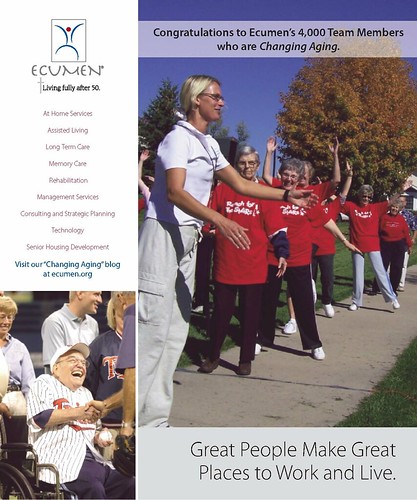 The Business Journal highlighted Ecumen’s dual commitment to delivering great customer experiences and innovating. Highlighted was the Ecumen Innovation Station, the growing Ecumen University learning program and Ecumen’s Family Helping Family initiative, which provides interest-free loans to employees facing household and family emergencies. In 2006, more than $175,000 was granted for a number of events from house fires to paying for funerals. Many employees donate to this fund through payroll deducation.Ecumen is being shaped by more than 4,000 team members. For insight from one of those people and ingredients that go into making a great workplace, read Ecumen CEO Kathryn Roberts ' article 'Does Your Workplace Have Soul?'
The Business Journal highlighted Ecumen’s dual commitment to delivering great customer experiences and innovating. Highlighted was the Ecumen Innovation Station, the growing Ecumen University learning program and Ecumen’s Family Helping Family initiative, which provides interest-free loans to employees facing household and family emergencies. In 2006, more than $175,000 was granted for a number of events from house fires to paying for funerals. Many employees donate to this fund through payroll deducation.Ecumen is being shaped by more than 4,000 team members. For insight from one of those people and ingredients that go into making a great workplace, read Ecumen CEO Kathryn Roberts ' article 'Does Your Workplace Have Soul?'
Successful Aging and Exercising the Mind, Body and Spirit
Parmly LifePointes, an Ecumen community in Chisago City, Minnesota, is embarking on a very cool new journey built upon successful aging. Their new Vitalize! Wellness Centre, opening this fall , will have all the bells and whistles … TechnoGym weights and TechnoGym aerobic fitness equipment that digitally measure one’s personal progress, a warm-water lap pool, a warm water pool with a treadmill, herbal teas and great food, exercise rooms, massage, plus classrooms for lifelong learning that helps people explore, personalize and enhance dimensions of successful aging. Oh, don’t let me forget the feng shui garden.
Their new Vitalize! Wellness Centre, opening this fall , will have all the bells and whistles … TechnoGym weights and TechnoGym aerobic fitness equipment that digitally measure one’s personal progress, a warm-water lap pool, a warm water pool with a treadmill, herbal teas and great food, exercise rooms, massage, plus classrooms for lifelong learning that helps people explore, personalize and enhance dimensions of successful aging. Oh, don’t let me forget the feng shui garden.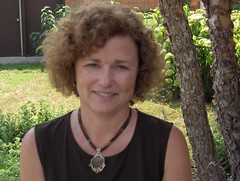 Patricia Montgomery, is the director of Vitalize!. A former college swimmer and corporate wellness director, Patricia, who is about to conclude her masters degree in holistic health at the College of St. Catherine, knows all about exercise of the physical type, but what she and the folks at Parmly LifePointes are focused on goes far, far beyond. As they look at wellness, they are going to be empowering people to empower themselves and exercise not just the physical parts of their being, but also the intellectual, vocational, social, spiritual and emotional parts.Vitalize! will be the place where a 25-year-old certified nursing assistant (what a great asset this will be for Parmly employees) and an 85-year-old who might have a chronic condition and lives in assisted living or the nursing home, go to take greater control of their life and how they travel through it.Vitalize! also will be open to the public. This isn’t Ballys or Lifetime Fitness, though. This is a completely different animal built on taking control of your own wellness no matter your age or your physical ability. And it’s built on the premise that aging is all about living …even at the end of life.
Patricia Montgomery, is the director of Vitalize!. A former college swimmer and corporate wellness director, Patricia, who is about to conclude her masters degree in holistic health at the College of St. Catherine, knows all about exercise of the physical type, but what she and the folks at Parmly LifePointes are focused on goes far, far beyond. As they look at wellness, they are going to be empowering people to empower themselves and exercise not just the physical parts of their being, but also the intellectual, vocational, social, spiritual and emotional parts.Vitalize! will be the place where a 25-year-old certified nursing assistant (what a great asset this will be for Parmly employees) and an 85-year-old who might have a chronic condition and lives in assisted living or the nursing home, go to take greater control of their life and how they travel through it.Vitalize! also will be open to the public. This isn’t Ballys or Lifetime Fitness, though. This is a completely different animal built on taking control of your own wellness no matter your age or your physical ability. And it’s built on the premise that aging is all about living …even at the end of life.
Seniors, Baby Boomers and Work
Quick note, the most e-mailed story of the last two days on The New York Times web site was the story we talked about yesterday, where people, nonprofits and others are working to enable seniors to stay in their neighborhoods and age in community. Independence strikes a chord.How Long Are You Going to Work? Chances are you’re reading this from work. Will you be working into your 70s, 80s, 90s … Maybe you’ll be like Waldo McBurney … Recently declared America’s oldest worker, he’s a 104-year-old beekeeper in Kansas.When we asked baby boomers about their future work plans in the Ecumen Age Wave Study, 'retirement' isn’t really in their vocabulary. Most plan to continue working. But there’s an important caveat. A bunch of them said they’re going to be switching jobs and doing something they enjoy. Many said pay is important, but just as important were social connections and mental engagement.Senior Workforce Today About 6.4 percent of Americans 75 or older, or slightly more than 1 million, were working last year. That’s up from 4.7 percent, or 634,000, a decade earlier, according to the U.S. Department of Labor.About 3.4 percent of Americans 80 or older, or 318,000, were in the work force last year, up from 2.7 percent or 188,000 a decade earlier, officials said.That’s only going to grow and change the workplace and how people work. For example, could companies keep talent and people, and provide a flexible work schedule in exchange for health benefits rather than a full salary? Those are the types of questions Ecumen and other companies are asking as we enter this new world where there will be more seniors and fewer young people. Are there any ideas you have or have seen elsewhere?
Successful Aging in Place, Successful Aging in Community
Here’s a movement that is quickly picking up speed and is only going to get more fervent as the age wave rises - the desire to package products and services that enable a person to age in place (More people are calling it aging in community' because they see themselves as being connected to the larger community, not just one place.).Ecumen leader Kathryn Roberts wrote about this in last week’s Minneapolis Star Tribune. Here you can access her article. Today the New York Times has an article about a group of people it says is part of a movement to make neighborhoods comfortable places to grow old, both for elderly men and women in need of help and for baby boomers anticipating the future.When you read this, one can see an opportunity for a number of America’s nursing homes and assisted living communities to diversify their offerings, create partnerships and to deliver their expertise outside of bricks and mortar. What do you think? Have you heard of others doing this?

